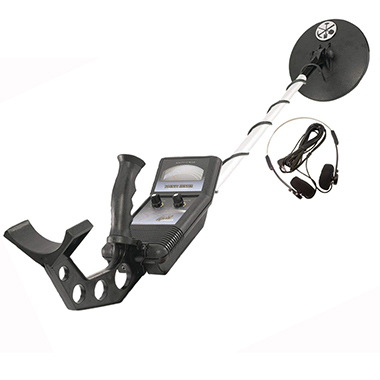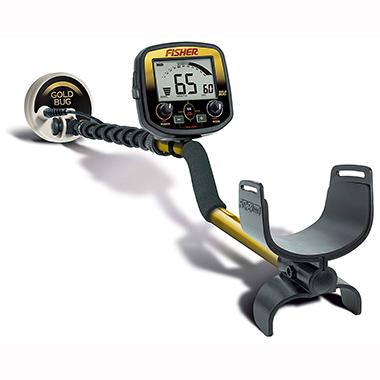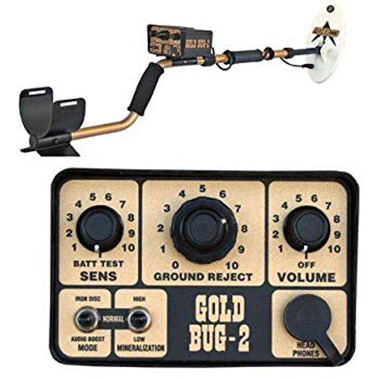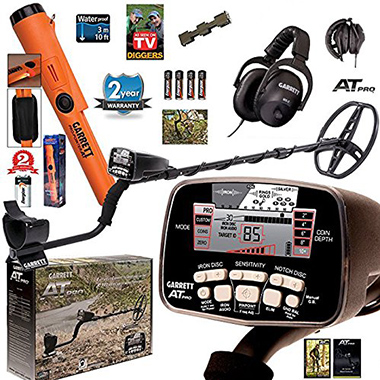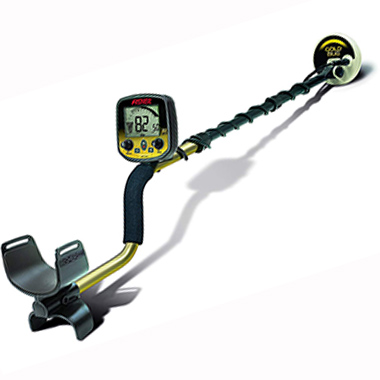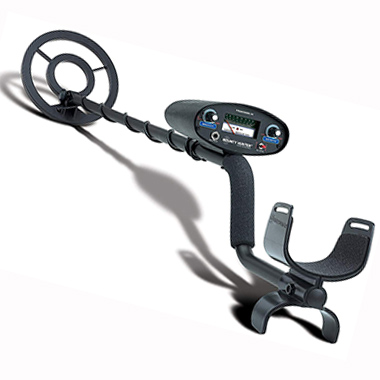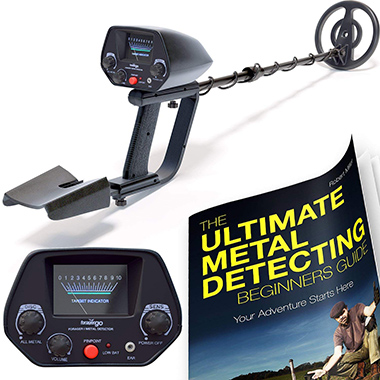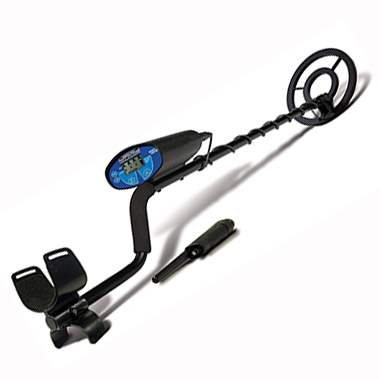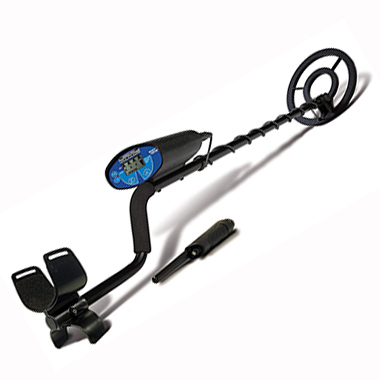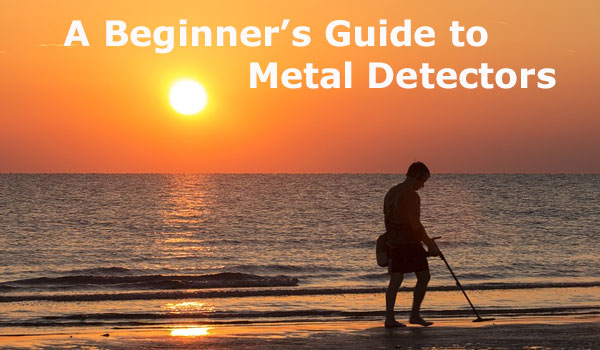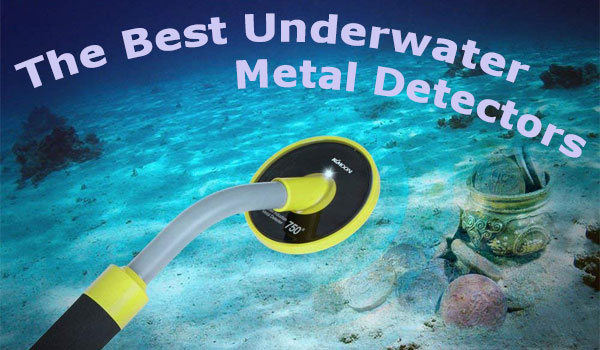The Best Beach and Beginner Metal Detectors
 If you have read about the fortunes people struck using metal detectors, you probably want to own one right now. But then, these devices are not as straightforward as you may think.
If you have read about the fortunes people struck using metal detectors, you probably want to own one right now. But then, these devices are not as straightforward as you may think.
The best thing to do to become a pro treasure hunter is to start with something small before you get deeper into high-performance metal detectors.
Besides, you don’t want to spend a fortune on a metal detector only for the activity to bore you after a week or two. For those reasons, it would be wise to get a beginner’s metal detector and learn as you progress.
Image | Dimensions / Weight | Operating frequency | Coil Size | Pinpoint Mode | Warranty | Check Price |
|---|---|---|---|---|---|---|
Best Metal Detectors for Gold and Coins |
||||||
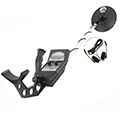 Bounty Hunter Gold Digger | 6 x 9 x 20.5 inches/ 2.2 lbs | 6.6 kHz | 7 inch weather resistant coil | 5 Years | Check Price | |
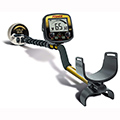 Fisher Gold Bug | 28.3 x 6 x 10 inches/ 4.6 pounds | 19kHz | 5-inch waterproof coil | No-motion pinpoint | Manufacturer’s warranty | Check Price |
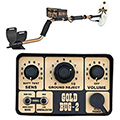 Fisher Gold Bug 2 | 21.4 x 12.3 x 5.7 inches/ 2.9 pounds | 71 kHz | 6 inch coil | Manufacturer’s warranty | Check Price | |
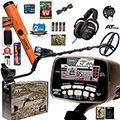 Garrett AT | 21.3 x 14.4 x 8.7 inches/ 7.4 pounds | 15 kHz | 8.5" x 11" PROformance™ DD submersible searchcoil | 2 Years | Check Price | |
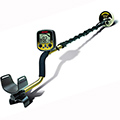 Fisher Gold Bug Pro | 10.2 x 6.2 x 28.5 inches/ 2.5 lbs | 19kHz | 5'' DD Round Closed Waterproof Searchcoil | No-motion Pinpoint with Depth Indicator | 5 Years | Check Price |
The Best Beach Metal Detectors |
||||||
Bounty Hunter Tracker IV | 28.2 x 10 x 6.2 inches/ 4.2 lbs | 6.6 kHz | 8 inch waterproof coil | 5 Years | Check Price | |
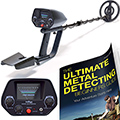 NHI Forager I | 24.1 x 7.5 x 5.1 inches/ 2.65 pounds | 6 kHz | 8 inch waterproof coil | 2 Years | Check Price | |
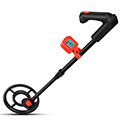 DR.ÖTEK-Junior-Detector | 76.7 x 19.3 x 6.4 cm/ 1.06 Kg | 6.5 to 6.8k Hz | 8-inch coil | Manufacturer’s warranty | Check Price | |
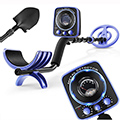 INTEY GC-1065 Professional | 5.5 x 8.5 x 22.5 inches/ 4 pounds | Regarding performance | 1" coil is waterproof | Manufacturer’s warranty | Check Price | |
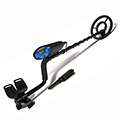 Bounty Hunter QSIGWP | 28.3 x 6 x 10 inches/ 2.25 pounds | 6.6 kHz | 8 inch waterproof search-coil | 5 Years | Check Price | |
Best Metal Detectors for Gold and Coins
If you are into metal detectors hoping to strike a fortune soon, you might want to buy a gold and coins metal detector. So, what are the best metal detectors for gold and coins?
1. Bounty Hunter Gold Digger – An Inexpensive Metal Detector
However, I tend to associate it more with kids primarily because of its weight and ease of operation. It can detect metals, including gold and coins up to 2 feet but I wouldn’t recommend it if you are serious in searching for gold and coins.
Though it operates at 6 kHz, it is not reliable as it misses some targets and gathers a lot of trash despite having discrimination.
If you are looking for a basic metal detector for kids and occasional tasks, this is a great deal. However, for some real treasure hunting, you need something bigger.
2. Fisher Gold Bug – The Best Fisher Metals Detectors
Gold Bug boasts an LCD that by far makes operation very easy compared to Gold Bug 2. You don’t have to be an experienced hunter to use this detector as long as you chose your prospecting ground wisely.
On display, you can see the Target ID, Ground Phase value and Ground Phase value and a Fe3O4 meter. Ground balancing is automatic, so you don’t have to worry about the highly mineralized fields.
Regarding the coil, it comes with a 5-inch waterproof coil meaning you can also tag along with the Gold Bug to the beach, a major hotspot for gold and coins.
3. Fisher Gold Bug 2 – The Latest Gold Metal Detector
The biggest difference between the older model Gold Bug and the new Gold Bug two is the interface.
You will agree with me that the LCD in Gold Bug makes it more fragile than Gold Bug 2.
But the 71 KHz operation frequency is what makes Gold Bug 2 the best metal detector for small gold nuggets. This is the highest frequency in the market so if you doubted its value; there you have the answer.
4. Garrett AT – With a Pinpointer
It packs a durable DD coil and optional automatic ground balance. It will also find coins as well, but only if you take your search in potent areas.
If you are looking at the build quality, I will buy Garret instead of Gold Bug; the latter’s control box is fragile and exposed the display.
Regarding performance, it may not match Fisher Gold Bug 2 but will offer quite some good performance, better than Gold Bug.
The price is quite high, but then, it offers everything you’d want in a gold and coins metal detector.
Besides, it comes with a pinpointer, which you don’t find in just any other metal detector.
5. Fisher Gold Bug Pro – Affordable Metal Detector
If you do beach hunting prospecting for gold, this is a metal detector you want to use. Though not submersible, I like the fact that it has a slightly bowing design as well as the handle. No other parts come into contact with the ground except the coil and stand.
When working in muddy fields, this is a great feature. But it’s performance that puts Gold Bug Pro on the map.
This is a 19 KHz metal detector with manual and automatic ground balance. The display is also amazing and will show you lots of information about the target as well as the ground.
I also find the price affordable considering it’s cheaper than Gold Bug 2 and offers the same performance.
The Best Beach Metal Detectors
The beach happens to be a great place where you can start your treasure hunting. The waters tend to wash a lot of stuff on the shore, including treasures.
However, you need to get the best metal detectors for beach treasure hunting, nothing more, nothing less.
Here are our top 5 picks if you are looking for a beginner metal detector for beach treasure hunting.
1. Bounty Hunter Tracker IV – Ideal for Detecting Treasure in Extreme Ground Conditions
Apart from that, the performance is quite okay for cheap metal detector. It has been rated at 6.6 KHz and comes with a submersible coil, so if you are a beach hunter, this metal detector can also be tagged along.
The operation is easy courtesy of a signal meter and adjustments knobs. If you are a beginner looking for coins, gold and other treasures on land, and beach, this is a great place to start.
However, there is a lot that ought to be done regarding its accuracy and working depth, but if it reaches that point, it will be time to get an intermediate metal detector.
2. NHI Forager I – With a 5-in-1 Free Accessory
The performance is also impressive but more or less the same as what Bounty Tracker TK4 offers. What you will realize is that they are both 6 kHz rated and have an 8-inch coil and have problems finding small targets even at 2 inches, especially on beaches and other highly mineralized fields.
But as a disclaimer, this is not an adult’s metal detector; if you are 6’2 and above, you will strain when using it.
However, for kids, teens and average body sizes, it is perfect regarding performance and value for money!
3. DR.ÖTEK Junior Detector – The Best Metal Detectors for Kids
DR.ÖTEK Junior Detector is among the best metal detectors for kids, you are sure of something lightweight and easy to use.
That’s what this metal detector is all about. Though it has the most uncomplicated design and lacks most of the standard features, it can indeed find gold and coins, but its vision is very poor.
On open ground, it will work very fine, but on beaches, it fails to detect a silver coin at two inches.
The build quality is what makes it outstanding as kids will be very careless with the detector.
At least we have a sturdier frame than what we have in Bounty Hunter.
4. INTEY GC-1065 Professional – With Multi-function folding shovel
It also features a similar stand like BOUNTY-ARC in Tracker TK4. However, I have to point out the poor construction build. Yes, the material might be strong and sturdy, but the finish is easily scratched or bruised.
It becomes worse if you go hunting in salt water. Though the coil is waterproof, the dents and scratches expose it to water, and that’s a recipe for corrosion.
Regarding performance, I wasn’t expecting much from a cheaply built metal detector.
It can find gold and metals in general to a distance of up to 4 feet. But still, false signals are quite common in the mineralized environment.
5. Bounty Hunter QSIGWP – Cheap Metal Detector for Beginners
The first thing about it is the size – it is cheap yes but not as small as a kid’s metal detector. It packs an 8-inch coil and has been rated at 6.6 kHz.
Usability is greatly enhanced with the display and one-touch sensitivity control. Though it may not stack up some high performance like the intermediate metal detectors, it is a very worthy alternative considering the low price.
There you have it, a review of the top 5 best metal detectors for beginners, and well as beach metal detectors. Now, I can’t guarantee you that these are going to be the best metal detectors in the market tomorrow.
Maybe a better detector is going to be released; it’s just a matter of when. The best thing to do is to master the art of buying.
You should know the critical aspects regarding metal detectors, and that will be our next business.
What is a Metal Detector?
But the most popular use is in treasure hunting. If you have heard about people striking gold and treasures, they use a metal detector. In the market, you will find metal detectors designed for different uses. Today, we have focused on beginner metal detectors and also, beach metal detectors.
Beginner metal detectors are for new entrants and don’t have most of the latest features. This is just a primary metal detector with the standard features. The salient feature of beginner metal detectors is the usability – effortless and straightforward. If you are a beginner, don’t go for an intermediate metal detector – it might be a little hard for you to use.
Worse is when it becomes hard to use until you give up on metal detecting. Oh! That reminds me of the price factor. Besides the user skill level, it is not a good idea to buy an expensive intermediate metal detector – there is a chance that the new hobby will bore you and that’s how you will have wasted a cool $1000 or even more. And let no one cheat you that selling a used metal detector is easy, also if you do, it’s at a throwaway price.
Beach metal detectors, on the other hand, are designed for beach gold prospecting. Besides the gold, beaches are home to lots of lost coins, rings, necklaces and other precious stuff. These relics may be left by surfers, and beach tourists or they may be washed ashore too.
But why exactly must you buy a beach metal detector? As we are going to see later, the beach is one of the most mineralized places your treasure hunt will take you. That said, you want the right tool for the job lest you end up with lots of wrong signals.
Types of Metal Detectors
When it comes to beginner metal detectors and beach metal detectors, the conversation is mainly between Pulse Induction vs. Very-Low Frequency.
So, what’s the best detector technology between the two types of metal detectors?
VLF is synonymous with the cheap models. These metal detectors have two coils, one for signal transmission and the other for reception. They are the easiest to use.
Pulse Induction, on the other hand, is ideal for highly mineralized fields and uses one coil for transmission and reception as well. However, the primary principle of electromagnetic fields is the same.
What is the Best Metal Detector Frequency?
So, what is frequency, is it important and how does it come into play? That’s what we are about to find in this segment.
However, you will find both low and high frequencies, so it’s important to know what each offers.
Now, back to our question, what is the best frequency? I will say it time, and again, there is no such thing as the best metal detector frequency. Low frequencies are best for hunting high conductivity metals that are deep in the ground.
So, if you are prospecting for gold, a low-frequency metal detector is the best.
High-frequency metals detectors, on the other hand, are ideal for finding low conductivity metals that are shallowly located.
Discrimination
You will agree with me that there is a lot of useless iron lying on the ground and this might shoot up the excitement thinking you have struck something precious only to find an old piece of metal.
There are three different discrimination options available; variable, botch and iron junk. The first discrimination is what you find in many of the metal detectors and allows detectorists to choose the response phases of the metals they don’t want. The second discrimination option is called notch, and this one differs from a variable in that it marks a specific metal that you want or what you don’t want. Lastly, iron junk shields all iron trash from being visible to your metal detector.
Display or No Display
There is the conversation around screen metal detectors and non-screen. I want us to put that matter to rest today.
Ideally, it is assumed that a metal detector with a digital display is the best and in fact, the latest model. I agree this might be the case with many, but it’s not necessarily the case with metal detectors. For example, if you are looking for a gold and coins metal detector, you have the option of choosing between Fisher Gold Bug and Fisher Gold Bug 2.
On the other hand, the new version, Gold Bug 2 costs a lot and has knobs only. The thing is that in metal detecting, a display is not such an essential feature for experienced metal detectors. However, for amateurs and hobbyists who are new to the game, it is an impressive feature.
Ground Balance
In the market, you will find different types of ground balance settings.
There is manual ground balance, automatic and tracking ground balance.
So, what’s the best ground balance setting?
Manual ground balance settings usually are in the basic metal detectors and can also be found in intermediate and expert metal detectors.
Automatic ground balance is the best for beginners because it adjusts autonomously. Tracking is also another excellent option, but rare. In this mode, the detector changes the ground balance as you move from different place to another.
This is the best ground balance setting as you will never pas a treasure because of mineralization. Also, it dramatically reduces wrong signals.
What’s the Best Coil?
So, what are the crucial aspects of the coil?
If you did your homework, you understand that a metal detector determines how deep your metal detector will go. The principle is, a 5-inch diameter coil will go 5 inches deep. That is to say the larger the diameter, the wider and deeper the search. This is true, but then, there is more to it than what meets the eye.
Factors to Consider when Buying Metals Detectors
I understand that we have talked quite a lot regarding metal detectors. A lot of this information may be necessary for you, but then, for an occasional detector, it is junk. This is the fundamental part of the buying guide, and here, we are going to have a little chit-chat about what you need to consider when buying a metal detector; whether as a beginner or for beaches.
1. The big brands
In my other metal detector reviews, I have reiterated the importance of buying top brands. Yes, there are these cheap upcoming brands, but then, it depends on how much of a risk taker you are. I’d instead stick to the household names I know – Fischer, Garrett, Minelab and the rest.
Only top brands guarantee value for money. At least you are also sure of a genuine warranty, unlike these cheap brands that won’t honor their warranty. To make it worse, most of these cheap brands have substandard products – check the reviews, it’s all there.
2. What’s your budget?
What is your budget? After you have spotted your preferred brand, you need to set a budget and start shopping in the right areas. It is of no need to waste your shopping time in the wrong category. The best way to go about this is to shop based on your experience level.
In the market, you will get a beginner to expert level metal detectors. A good beginner metal detector will set you back an average of $100. This is a solid metal detector like Bounty Hunter Discovery 2200 that will find both gold and coins. However, the biggest problem remains ground mineralization. Most of them can’t be used in saltwater and other highly mineralized places.
3. Digital or analog?
If you have shopped around, you must have realized that there are detectors that come worth a display together with adjustment knobs and buttons and others have adjustment knobs only. For beginners, get a metal detector with a digital display. This makes it easier for you to understand your search area as well as the target.
INTEY GC-1065 Professional is a good example; it has a basic stand that enables you to keep the detector lying flat on the ground.
Also, consider the ruggedness of the tool. A display makes your metal detector more vulnerable. Otherwise, for beach metal detecting, anything goes so whether you have Gold Bug or Gold Bug 2, you are good to go!
4. Working frequency
The working frequency doesn’t matter when it comes to user levels. Whether you are an amateur or professional gold hunter, you want a detector with the right frequency, nothing short of that. But when it comes to beach hunting, you need to be very careful with the frequency you choose.
The first thing to note is that single frequency detectors are a big NO. Pick between a Pulse Induction and a multiple-frequency. Multiple frequency detectors are ideal if you are looking for a versatile metal detector. It can work well in other fields too.
The discrimination feature is also available, something Pulse Induction detectors lack. But then, if you are keen on finding small gold nuggets, you need a pulse induction metal detector.
Another thing, how deep is your search? This largely depends on the geographical area and the distribution of rocks and the precious metals.
5. Coil
We all know that the wider the coil, the faster the search thus making larger coils best for extensive search fields. However, I disagree with the assumption that the wider the coil, the deeper the search. To some extent, this might be true but don’t forget that the type of coil matters too. We have DD and Concentric coils.
On the other hand, DD coils work deep in the ground and are best for mineralized grounds and salt waters. For a beginner, this might not make any sense to you, but for beach hunters, you understand how the ground minerals affect the signal.
6. Target ID
This refers to the mode by which the metal detector notifies you if it has detected something. The standard target ID is through tones – maybe two or three. The more the beeps, the better. Typically, metal detectors have speakers inside, but you can opt for headphones if you are in a windy environment. There are also metal detectors that have LEDs, and these may come in handy when hunting in the beach at night.
Others, especially underwater hand metal detectors have vibration so you can concentrate on the surrounding and react immediately you feel the vibration. Don’t worry so much here because the speakers work just fine if not, you can use headphones.
7. Accessories
A metal detector requires several accessories to get the best treasure hunting experience. You may need a pouch for keeping your finds, the charger, and extra battery pack among others. Pinpointers also come in handy to ensure you don’t dig a big hole.
There are metal detectors that come with these accessories while in others, you might be required to buy separately. It will be a great idea if a metal detector comes with one of these accessories included.
8. Warranty and aftersales
Your detector may fail to power on for no apparent reason. You may also find it hard to set it up or even balance it. That said, you need a metal detector that has the best aftersales.
The first thing to consider is the warranty – the longer, the better. An excellent online or telephone support will also be resourceful for beginners.
Another unique factor to consider is the availability of support resources online. This is in the form of tutorials, whether in text or videos. The easiest way to get all these factors packaged is to get a top brand. I don’t need to say that again!
Frequently Asked Questions
Can I search for gold and silver with a metal detector?
Are metal detectors simple enough for kids to use them?
Can I use my metal detector underwater?
Are metal detectors heavy?
Wrapping Up
Now, we have come to the end of this review of the best metal detectors for beginners and beach detecting. If you are venturing into this adventure, make sure you start with the right metal detector lest the newly found hobby bores you.
Also, find the best hunting grounds – you won’t find gold where there is none, even with a $10,000 expert metal detector. That said, we have come to the end of this review.
Make sure to tell us what you think about metal detecting and for any related questions, feel free to ask the experts in the comments section below.

